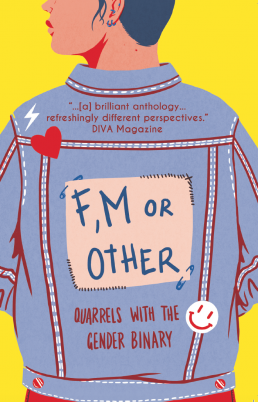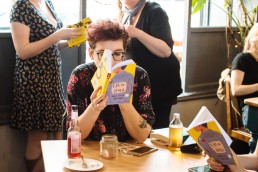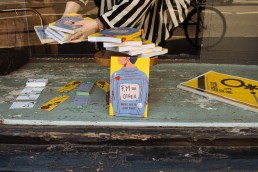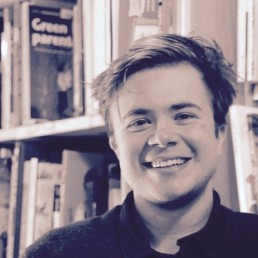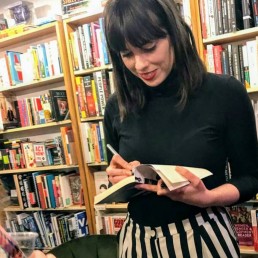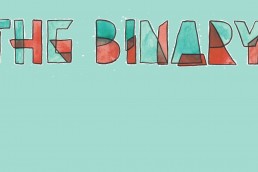Photgraphy: Chris Belous
Ellen Desmond meets with Nathaniel Kunitsky of Knight Errant Press upon the release of their new anthology F, M or Other: Quarrels with the Gender Binary, to discuss all things gender non-conforming and mental health support for NB and trans people
Q. Would you like to talk a little bit about how F, M or Other came to be?
A. I don’t really see much about trans and NB people and experiences that are fictional or in any way “not academic”. So anytime I go to a shop that would have a section on LGBTQ+ it would either be academic research – or stuff that’s very specific to gay or lesbian sexuality and nothing in between – and that kind of thing can be very scary to read at first so I thought, well, I don’t see much of this kind of thing out there.
Q. Can you tell me a little bit more about the gender binary and the impact you think it has on the way we have to live?
A. I think people don’t often think of themselves as a gendered being that often, until a situation like if you ask them upfront. I think it’s not about are you female or are you male, it’s more like are you comfortable as you are. Just like not everybody feels comfortable with the body that they have. A body doesn’t have to be gendered. I think a lot of people in their minds are non-binary, in the kind of day-to-day way, but the way they appear or choose to dress can sometimes align with what they have in their documents, a binary gender marker that has been assigned to them. I think when people choose to transition they often start out being very binary in their heads and part of that is expectation and part is that going from point A to point B feels safer; it feels like there’s a destination. But some people, they get to the ‘middle’ and think you know what that’s enough that’s good, and after that they start having to figure out how to live in the world as non-binary and I think either if people around us or like, government and the structures around us made it easier to just be instead of be one or the other…
Q. Does the book paint a picture of how the gender binary might look 20 years from now? Or are there any clear trends that point to how we might organise society by gender in the future?
A. I think it’s the agency that’s important in these stories not just how the future world is structured. Some of it is structured with improvements – I think we’d call them that – but in fiction at the moment I think it’s more important to place main characters who are gender non-conforming and give them agency. I’d love to see more positive futures with non-conforming and trans characters, and I’ll look out for them. The stories capture ways others treat you, and say it’s ok to move away from others who are harmful to you. There’s no part in our book that says non-conforming people are the baseline [and there are cis writers and outlooks in the book too]…but we’re open for submissions for volume two so it might happen yet!
Q. Is mental health discussed in the anthology?
A. Yes, it comes up in the book. We’ve got a trigger warning at the beginning where we’ve highlighted the most difficult pieces. Even our team has gone through mental health stuff because we’ve had to go through so much personal writing when editing this book. I think there’s a lot of really personal works in the anthology that touch on mental illness – if not always in an obvious way – then in the way the piece is worked through, it is often a process. The warning is there for you to be aware of triggering topics in general. Because it’s talking about gender it references mental health, I think it is deeply interweaved.
We tried our best to put together works that had a pattern to them, where the stories had at least something to uplift them. I don’t think reading this you’ll think they’re all too positive or that they don’t recognise the issues the LGBTQ+ community faces today, it’s more about thoughtfulness. There was a lot of heavy content so we needed to pace it.
Q. In an ideal world how do you think governments can better support the mental health of NB and trans people?
If you have your family support they can then rally behind you to change the government, if you don’t have support in your close quarters it supports the systems that already exist. But outside of that, access to better, comprehensive counselling for trans and NB people before taking HRT because if you take it without being fully certain, or feel pressured into it, your mental health can just go…whoosh. Some groups want to change that for complete body autonomy and I’m less up for that. I think it’s better to have open-minded professionals who recognise that if someone’s not too sure about the full effect, the policy is to maybe put you on a smaller dose first. Governments should work harder to provide better, up-to-date training for medical staff and counsellors. And then there’s this let’s talk in 6 months – it should be possible to meet your GIC more regularly, something which governments and funding can effect. I think if governments give psychology foundations more funding to train counsellors specifically on LGBT issues – they’ll be able to improve way quicker than if they are trying to source funding for that elsewhere. Likewise, working with and giving grants and funding to more people doing relevant research.
The name change process in the UK – through the court of justice – is simple enough and from then on everyone is legally obliged to change and use your name. Yet it is still very awkward when you have to call someone like PayPal and they say oh is this just fraud – there should be training guidelines for this – and guidelines for workplaces dealing with trans and NB employees too. Residential permits with the Home Office for non-EU people – how to fill them out – make the process clearer. If governments could be more transparent on their policies, sometimes it feels like it might be hit or miss even if the law is on your side, because you never really know how a local office works and who makes the final call. More funding for support groups by local charities like LGBT Health and Wellbeing and LGBT Youth; making those support groups even more regular and accessible would be great.
Q. What would you say to young people struggling to see a place for themselves among prescribed gender roles and expectations?
Your mental health and wellbeing is more important than giving a person the time of day if they are hurtful to you. If they want to meet up or talk it out, then on your terms. If your parents don’t want to lose you, they better grow up and support. Of course many young people are dependent on others so I’m not keen on shouting advice, I don’t want to put people at risk. Having support groups and safe spaces for people is so important.
Support for places like a shelter for LGBT folks and safe houses. That would be a great thing to have because young people often suffer most in their ‘home’. A lot of young people on the street are LGBT because their families are unaccepting and they find themselves between a rock and a hard place and when they put their mental health first, sometimes instead of feeling like dying every day, they think you know, it’s not so cold outside. Well, that’s maybe playing it down. This is why educating parents about keeping children healthy, safe and communicating with you is so important and parents need to receive that education in a here’s how, not a condescending way.
Q. How do you think someone can be the best ally they can be to a friend who might be struggling with gender identity?
I think asking what you can do to help and listening to people. It seems like the most clichéd advice. Just listen to people, I think, and be kinder. Some people, families and stuff, say oh it’s just difficult to incorporate “they” into speech or I’ve known you for so long it’s just hard to remember to use these new pronouns or this new name. Don’t be that person. We often put out these micro-aggressions to people we care about, even when we’re quite enlightened. You know, if somebody looks quite feminine and they change their looks and someone else says they look very gay or something, if people just think more about what they say, and pull people up on it occasionally, I think it will become a chain reaction to ungendered language.
Nathaniel Kunitsky
Nathaniel is the founder of Knight Errant Press, he loves languages and stories and sometimes dabbles in translation. He has found a calling in publishing and a way to engage with the world as an activist. Curating the kind of content he wants to see more of in the world, Knight Errant publish a polyphony of voices from the margins.
Ellen Desmond
Ellen Desmond grew up in Ireland, where she worked at editorial and project management level on various magazines and publications aimed at students. She was awarded the title of Ireland’s Best Student Editor in 2016, just before she moved to Edinburgh to complete an MSc in Publishing. She has co-edited and published a popular anthology about bisexuality. She is a passionate intersectional feminist, and an advocate of mental health reform and LGBTQ+ rights.
As Assistant Editor she is responsible for commissioning and editing great content for Fearless Femme, and conducting research on mental health to support the social mission of Fearless Femme.

